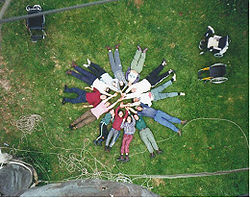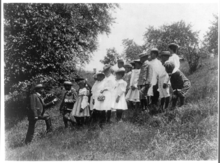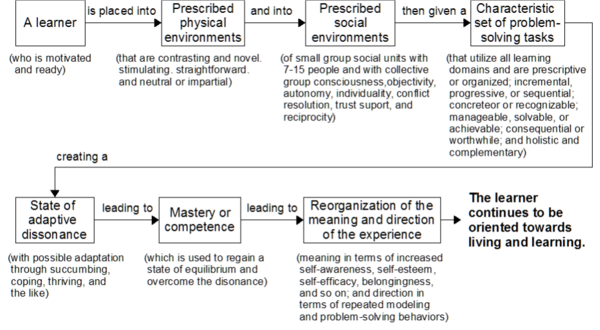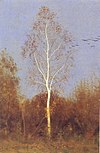
Outward Bound (OB) is an international network of outdoor education organizations that was founded in the United Kingdom by Lawrence Holt and Kurt Hahn in 1941. Today there are organizations, called schools, in over 35 countries which are attended by more than 150,000 people each year. Outward Bound International is a non-profit membership and licensing organisation for the international network of Outward Bound schools. The Outward Bound Trust is an educational charity established in 1946 to operate the schools in the United Kingdom. Separate organizations operate the schools in each of the other countries in which Outward Bound operates.

NOLS is a non-profit outdoor education school based in the United States dedicated to teaching environmental ethics, technical outdoor skills, wilderness medicine, risk management and judgment, and leadership on extended wilderness expeditions and in traditional classrooms. It was previously known as the National Outdoor Leadership School, but in 2015, this label was retired in favor of the independonym "NOLS". The "NOLS" mission is to be the leading source and teacher of wilderness skills and leadership that serve people and the environment. NOLS runs courses on six continents, with courses in a variety of wilderness environments and for almost any age group.

Experiential education is a philosophy of education that describes the process that occurs between a teacher and student that infuses direct experience with the learning environment and content. The term is not interchangeable with experiential learning; however experiential learning is a sub-field and operates under the methodologies of experiential education. The Association for Experiential Education regards experiential education as "a philosophy that informs many methodologies in which educators purposefully engage with learners in direct experience and focused reflection in order to increase knowledge, develop skills, clarify values, and develop people's capacity to contribute to their communities". Experiential education is the term for the philosophy and educational progressivism is the movement which it informed. The Journal of Experiential Education publishes peer-reviewed empirical and theoretical academic research within the field.

Experiential learning (ExL) is the process of learning through experience, and is more narrowly defined as "learning through reflection on doing". Hands-on learning can be a form of experiential learning, but does not necessarily involve students reflecting on their product. Experiential learning is distinct from rote or didactic learning, in which the learner plays a comparatively passive role. It is related to, but not synonymous with, other forms of active learning such as action learning, adventure learning, free-choice learning, cooperative learning, service-learning, and situated learning.

A summer camp or sleepaway camp is a supervised program for children conducted during the summer months in some countries. Children and adolescents who attend summer camps are known as campers. Summer school is usually a part of the academic curriculum for a student to make up work not accomplished during the academic year.

Environmental education (EE) refers to organized efforts to teach how natural environments function, and particularly, how human beings can manage behavior and ecosystems to live sustainably. It is a multi-disciplinary field integrating disciplines such as biology, chemistry, physics, ecology, earth science, atmospheric science, mathematics, and geography.
Forest school is an outdoor education delivery model in which students visit natural spaces to learn personal, social and technical skills. It has been defined as "an inspirational process that offers children, young people and adults regular opportunities to achieve and develop confidence through hands-on learning in a woodland environment". Forest school is both a pedagogy and a physical entity, with the use often being interchanged. The plural "schools" is often used when referring to a number of groups or sessions.

Adventure therapy is a form of psychotherapy created as early as the 1960s. It is influenced by a variety of learning and psychological theories. Experiential education is the underlying philosophy.

Outward Bound Singapore is part of the network of Outward Bound centres worldwide. Established in 1967 as Outward Bound School of Singapore (OBSS), OBS has a campus located on the island of Pulau Ubin.
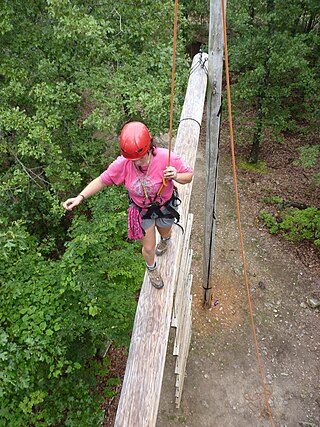
COPE is an acronym for Challenging Outdoor Personal Experience, a program in the Boy Scouts of America. It consists of group initiative games, trust events, and high and low ropes course. Some activities involve a group challenge, while others develop individual skills and agility. Participants climb, swing, balance, jump, rappel, and devise solutions to a variety of problems.
Adventure education is the promotion of learning through adventure centered experiences.
Outward Bound USA (OBUSA) is a non-profit organization providing experiential education in the United States through a network of regional schools, especially in wilderness settings. Outward Bound counts among its desired outcomes the development of self-awareness, self-confidence, leadership skills, environmental and social responsibility.
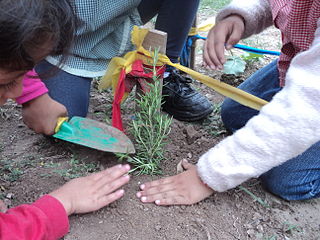
Garden-based learning (GBL) encompasses programs, activities and projects in which the garden is the foundation for integrated learning, in and across disciplines, through active, engaging, real-world experiences that have personal meaning for children, youth, adults and communities in an informal outside learning setting. Garden-based learning is an instructional strategy that utilizes the garden as a teaching tool.
Expeditionary education is often associated with adventure education, outdoor education, environmental education or experiential education and refers specifically to learning associated with exploration and journey-based experiences or expeditions within these fields. Usually involving elements of challenge, adventure and leadership, expeditionary education can take place in a variety of settings including wilderness, classrooms and even virtual spaces. Participants in expeditionary education can be directly involved in the expedition, or may be linked to expeditions undertaken by others.
Boston Schoolyard Initiative (BSI) is a public private partnership that works to transform the conditions of public schoolyards of Boston Public Schools. BSI, in collaboration with private funders, the City of Boston and Boston Public Schools, uses a community participatory design process to change neglected and unwelcome schoolyards into centers for active school and community use.
Outward Bound Costa Rica (OBCR) (formerly known as "Costa Rica Rainforest Outward Bound School" or CRROBS) is a non-profit experiential learning and outdoor education organization based in San José, Costa Rica. It is a charter of Outward Bound International (OBI).

Carrie Murray Nature Center (CMNC) is operated by Baltimore City Recreation and Parks. CMNC offers environmental education programs for children, families, and adults as Baltimore City's only nature center. A native live animal collection, outdoor bird aviary, and indoor exhibits are features of the center, which is nestled in the expansive and historic Gwynns Falls/Leakin Park, the largest urban forested park east of the Mississippi River.

The term learning environment can refer to an educational approach, cultural context, or physical setting in which teaching and learning occur. The term is commonly used as a more definitive alternative to "classroom", but it typically refers to the context of educational philosophy or knowledge experienced by the student and may also encompass a variety of learning cultures—its presiding ethos and characteristics, how individuals interact, governing structures, and philosophy. In a societal sense, learning environment may refer to the culture of the population it serves and of their location. Learning environments are highly diverse in use, learning styles, organization, and educational institution. The culture and context of a place or organization includes such factors as a way of thinking, behaving, or working, also known as organizational culture. For a learning environment such as an educational institution, it also includes such factors as operational characteristics of the instructors, instructional group, or institution; the philosophy or knowledge experienced by the student and may also encompass a variety of learning cultures—its presiding ethos and characteristics, how individuals interact, governing structures, and philosophy in learning styles and pedagogies used; and the societal culture of where the learning is occurring. Although physical environments do not determine educational activities, there is evidence of a relationship between school settings and the activities that take place there.

Learning space or learning setting refers to a physical setting for a learning environment, a place in which teaching and learning occur. The term is commonly used as a more definitive alternative to "classroom," but it may also refer to an indoor or outdoor location, either actual or virtual. Learning spaces are highly diverse in use, configuration, location, and educational institution. They support a variety of pedagogies, including quiet study, passive or active learning, kinesthetic or physical learning, vocational learning, experiential learning, and others. As the design of a learning space impacts the learning process, it is deemed important to design a learning space with the learning process in mind.
